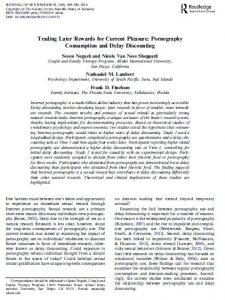Mental Health
Trading Later Rewards for Current Pleasure
 Full Article Title: Trading Later Rewards for Current Pleasure: Pornography Consumption and Delay Discounting
Full Article Title: Trading Later Rewards for Current Pleasure: Pornography Consumption and Delay Discounting
Open Access: No
Abstract
Internet pornography is a multi-billion-dollar industry that has grown increasingly accessible. Delay discounting involves devaluing larger, later rewards in favor of smaller, more immediate rewards. The constant novelty and primacy of sexual stimuli as particularly strong natural rewards make Internet pornography a unique activator of the brain’s reward system, thereby having implications for decision-making processes. Based on theoretical studies of evolutionary psychology and neuroeconomics, two studies tested the hypothesis that consuming Internet pornography would relate to higher rates of delay discounting. Study 1 used a longitudinal design. Participants completed a pornography use questionnaire and a delay discounting task at Time 1 and then again four weeks later. Participants reporting higher initial pornography use demonstrated a higher delay discounting rate at Time 2, controlling for initial delay discounting. Study 2 tested for causality with an experimental design. Participants were randomly assigned to abstain from either their favorite food or pornography for three weeks. Participants who abstained from pornography use demonstrated lower delay discounting than participants who abstained from their favorite food. The finding suggests that Internet pornography is a sexual reward that contributes to delay discounting differently than other natural rewards. Theoretical and clinical implications of these studies are highlighted.
Citation
Negash, S., Sheppard, N. V. N., Lambert, N. M., & Fincham, F. D. (2016). Trading later rewards for current pleasure: pornography consumption and delay discounting. The Journal of Sex Research, 53(6), 689–700. https://doi.org/10.1080/00224499.2015.1025123

